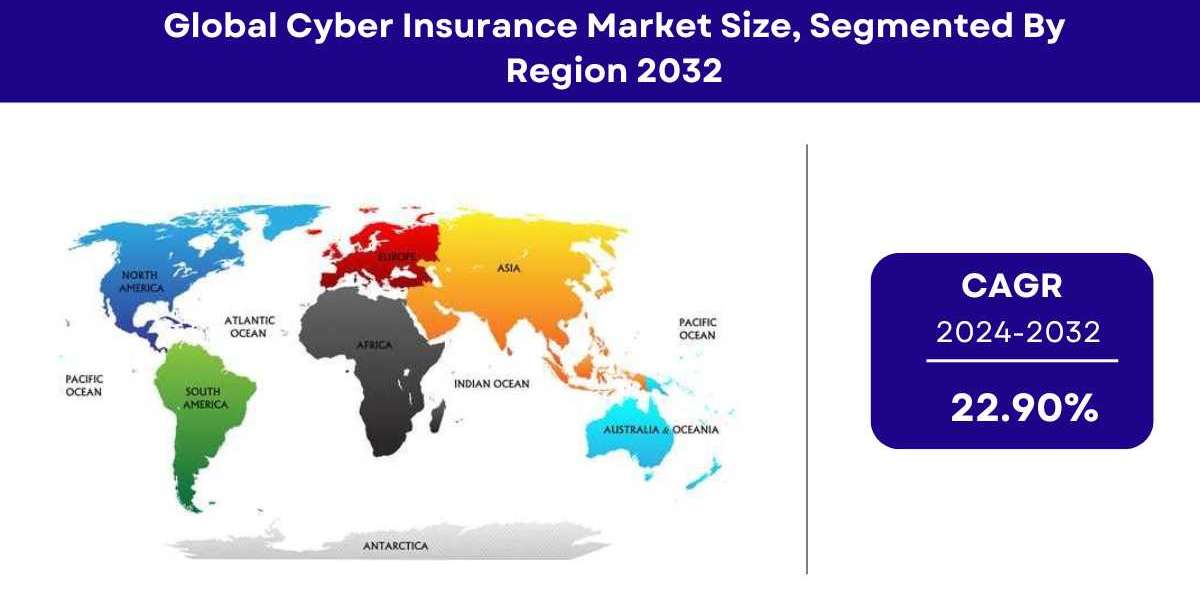Cyber Insurance Market Overview:
The Cyber Insurance Market has emerged as a vital component in the risk management strategies of businesses worldwide. As the digital landscape expands, the threat of cyberattacks has grown exponentially, driving the demand for specialized insurance products that can mitigate financial losses associated with data breaches, ransomware attacks, and other cyber incidents. The market for cyber insurance is characterized by rapid growth, driven by increased awareness among businesses of all sizes about the importance of safeguarding their digital assets. In 2024, the Cyber Insurance Market size is projected to grow from USD 13.13 Billion in 2024 to USD 68.35 Billion by 2032, exhibiting a compound annual growth rate (CAGR) of 22.90% during the forecast period (2024 - 2032). This growth is fueled by the increasing frequency of cyberattacks, stringent regulatory requirements, and the growing adoption of digital technologies across various industries.
Get a sample PDF of the report at –
https://www.marketresearchfuture.com/sample_request/8635
Competitive Analysis:
The cyber insurance market is highly competitive, with numerous players vying for market share. Leading insurance companies such as,
- AIG
- Chubb
- Zurich Insurance Group
dominate the market, offering a wide range of cyber insurance products tailored to the needs of different industries. These companies have established themselves as market leaders through their extensive experience in risk assessment, strong financial backing, and comprehensive coverage options. However, the market also sees significant competition from smaller, specialized insurers that focus exclusively on cyber risks. These niche players often provide more customized solutions, catering to the unique needs of specific industries or businesses. Additionally, the entry of new players and InsurTech companies is intensifying competition, driving innovation in product offerings and pricing models. The competitive landscape is further shaped by strategic partnerships, mergers, and acquisitions, as companies seek to expand their market presence and enhance their service offerings.
Market Drivers:
Several factors are driving the growth of the cyber insurance market. Firstly, the increasing frequency and sophistication of cyberattacks have made businesses more aware of the need for robust cybersecurity measures, including insurance coverage. High-profile data breaches and ransomware attacks have highlighted the financial risks associated with cyber incidents, prompting companies to seek insurance protection. Secondly, regulatory frameworks such as the General Data Protection Regulation (GDPR) in Europe and the California Consumer Privacy Act (CCPA) in the United States are compelling businesses to invest in cyber insurance to comply with data protection requirements. Thirdly, the rapid adoption of digital technologies, such as cloud computing, IoT, and AI, has expanded the attack surface for cybercriminals, making cyber insurance a critical component of risk management strategies. Finally, the growing awareness among small and medium-sized enterprises (SMEs) about the potential impact of cyberattacks on their operations is driving demand for affordable and accessible cyber insurance products.
Market Restraints:
Despite the strong growth prospects, the cyber insurance market faces several challenges that could restrain its expansion. One of the primary challenges is the lack of standardization in policy terms and conditions. The complexity of cyber risks, coupled with the rapidly evolving nature of cyber threats, makes it difficult for insurers to develop standardized policies that can be easily understood by businesses. This lack of clarity can lead to coverage gaps, disputes over claims, and a lack of trust in cyber insurance products. Additionally, the high cost of premiums is a significant barrier for many businesses, particularly SMEs, which may struggle to afford comprehensive coverage. Furthermore, the limited availability of historical data on cyber incidents makes it challenging for insurers to accurately assess risk and price policies appropriately. This uncertainty can lead to higher premiums or limited coverage options, further deterring businesses from purchasing cyber insurance. Finally, the rapid evolution of cyber threats means that insurers must continuously update their products and pricing models to stay relevant, adding to the complexity and cost of offering cyber insurance.
Segment Analysis:
The cyber insurance market can be segmented based on insurance type, organization size, and industry vertical. In terms of insurance type, the market is divided into first-party coverage, which covers direct losses such as data breaches and business interruption, and third-party coverage, which protects against liabilities arising from lawsuits or regulatory fines. First-party coverage dominates the market, as businesses prioritize protection against direct financial losses. Based on organization size, large enterprises account for the largest share of the market due to their higher exposure to cyber risks and greater financial resources. However, SMEs are expected to be the fastest-growing segment, driven by increasing awareness of cyber threats and the availability of affordable insurance products. In terms of industry verticals, the financial services sector holds the largest market share, owing to the high value of the data they handle and the stringent regulatory requirements. Other key industries include healthcare, retail, and manufacturing, each facing unique cyber risks that drive demand for specialized insurance products.
Browse a Full Report –
https://www.marketresearchfuture.com/reports/cyber-insurance-market-8635
Regional Analysis:
Geographically, North America leads the global cyber insurance market, accounting for the largest share of revenue. The region's dominance is attributed to the high adoption of digital technologies, a mature regulatory environment, and a strong focus on cybersecurity by businesses. The United States, in particular, is the largest market within North America, driven by a high incidence of cyberattacks and stringent regulatory requirements. Europe is the second-largest market, with the GDPR playing a significant role in driving demand for cyber insurance. The Asia-Pacific region is expected to witness the fastest growth during the forecast period, fueled by the rapid digitization of economies, increasing cyber threats, and growing regulatory focus on data protection. Countries such as China, Japan, and Australia are leading the adoption of cyber insurance in the region. Latin America and the Middle East Africa also present significant growth opportunities, although the market in these regions is still in the nascent stages of development.
The cyber insurance market is poised for significant growth, driven by the increasing prevalence of cyber threats and the growing awareness of the need for comprehensive risk management solutions. While challenges such as high premiums and lack of standardization exist, the market's future remains bright, with opportunities for innovation and expansion across various segments and regions.
Top Trending Reports:
Software Quality Assurance Market
Social and Emotional Learning Market
Contact
Market Research Future (Part of Wantstats Research and Media Private Limited)
99 Hudson Street, 5Th Floor
New York, NY 10013
United States of America
+1 628 258 0071 (US)
+44 2035 002 764 (UK)
Email: [email protected]
Website: https://www.marketresearchfuture.com








